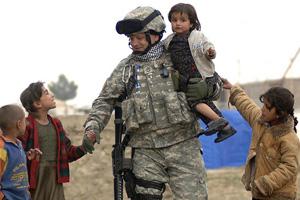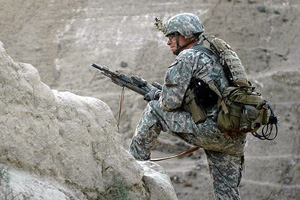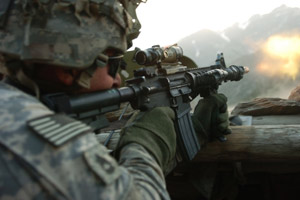
<a href="http://www.flickr.com/photos/soldiersmediacenter/465089161/">Tech. Sgt. Cecilio M. Ricardo Jr.</a> / US Army / Flickr
![]() This story first appeared on the TomDispatch website.
This story first appeared on the TomDispatch website.
Compare two assessments of the American future:
In the latest NBC News/Wall Street Journal poll in which 61% of Americans interviewed considered “things in the nation” to be “on the wrong track,” 66% did “not feel confident that life for our children’s generation will be better than it has been for us.” (Seven percent were “not sure,” and only 27% “felt confident.”) But here was the polling question you’re least likely to see discussed in your local newspaper or by Washington-based pundits: “Do you think America is in a state of decline, or do you feel that this is not the case?” Sixty-five percent of respondents chose as their answer: “in a state of decline.”
Meanwhile, Afghan war commander General David Petraeus was interviewed last week by Martha Raddatz of ABC News. Asked whether the American war in Afghanistan, almost a decade old, was finally on the right counterinsurgency track and could go on for another nine or ten years, Petraeus agreed that we were just at the beginning of the process, that the “clock” was only now ticking, and that we needed “realistic expectations” about what could happen and how fast. “Progress” in Afghanistan, he commented, was often so slow that it could feel like “watching grass grow or paint dry.”
Now, I’m not a betting man, but I’d head for Vegas tomorrow and put my money down against the general and on Americans generally when it comes to assessing the future. I’d put money on the fact that the United States is indeed “in a state of decline” and I’d make a wager at odds that US troops won’t be in Afghanistan in nine or ten years. And I’d venture to suggest as well that the two bets would be intimately connected, and that the American people understand at a visceral level far more than Washington cares to know about our real situation in the world. And I’d put my money on one more thing: however lousy it may feel, it’s not all bad news, not by a long shot.
Decline Today, Not Tomorrow
Let’s start with Afghanistan. Yes, we’ve been “in,” or intimately involved with, Afghanistan not just for almost a decade, but for a significant chunk of the last 30 years. And for much of that time we’ve poured our wealth into creating chaos and mayhem there in the name of “freedom,” “liberation,” “reconstruction,” and “nation-building.” We started in the distant days of the Reagan administration with the CIA funneling vast sums of money and advanced weaponry into the anti-Soviet jihad. At that time, we happily supported outright terror tactics, including car-bomb and even camel-bomb attacks on the Soviets in Afghan cities and bomb attacks on movie theaters as well. These acts were committed by Islamic fundamentalists of the most extreme sort, and our officials, labeling them “freedom fighters,” couldn’t say enough nice things about them.
That was our expensive first decade in Afghanistan. In 1989, when the Russians withdrew in defeat, we departed in triumph. You know the next round well enough: we returned in 2001, armed and eager, carrying suitcases full of cash, and ready to fight many of the same fundamentalists we (or our allies the Pakistanis) had set loose, funded, and armed in the previous two decades.
If, back in 1979, you had told a polling group of Americans that their country would soon embark on a never-ending war that would involve spending hundreds of billions of dollars, building staggering numbers of military bases, squandering startling sums (including at least $27 billion to train Afghan military and police forces whose most striking trait is desertion), losing significant numbers of American lives (and huge numbers of Afghan ones), and launching the first robot air war in history, and then asked them to pick the likely country, not one in a million would have chosen Afghani-where(?). And yet, today, our leading general (“perhaps the greatest general of his generation”) doesn’t blink at the mention of another 9 or 10 years doing more of the same.
After 30 years, it might almost seem logical. Why not 10 more? The answer is that you have to be the Washington equivalent of blind, deaf, and dumb not to know why not, and Americans aren’t any of those. They know what Washington is in denial about, because they’re living American decline in the flesh, even if Washington isn’t. Not yet anyway. And they know they’re living it not in some distant future, but right now.
Here’s a simple reality: the US is an imperial power in decline—and not just the sort of decline which is going to affect your children or grandchildren someday. We’re talking about massive unemployment that’s going nowhere and an economy which shows no sign of ever returning good jobs to this country on a significant scale, even if “good times” do come back sooner or later. We’re talking about an aging, fraying infrastructure—with its collapsing bridges and exploding gas pipelines—that a little cosmetic surgery isn’t going to help.
And whatever the underlying historical trends, George W. Bush, Dick Cheney, and company accelerated this process immeasurably. You can thank their two mad wars, their all-planet-all-the-time Global War on Terror, their dumping of almost unlimited taxpayer dollars into the Pentagon and war planning for the distant future, and their scheme to privatize the military and mind-meld it with a small group of crony capitalist privateers, not to speak of ramping up an already impressively over-muscled national security state into a national state of fear, while leaving the financial community to turn the country into a giant, mortgaged Ponzi scheme. It was the equivalent of driving a car in need of a major tune-up directly off the nearest cliff—and the rest, including the economic meltdown of 2008, is, as they say, history, which we’re all now experiencing in real time. Then, thank the Obama administration for not having the nerve to reverse course while it might still have mattered.
Public Opinion and Elite Opinion
The problem in all this isn’t the American people. They already know the score. The problem is Afghan war commander Petraeus. It’s Secretary of Defense Robert Gates. It’s Secretary of State Hillary Clinton. It’s National Security Adviser James Jones. It’s all those sober official types, military and civilian, who pass for “realists,” and are now managing “America’s global military presence,” its vast garrisons, its wars and alarums. All of them are living in Cloud Cuckoo Land.
Ordinary Americans aren’t. They know what’s going down, and to judge by polls, they have a perfectly realistic assessment of what needs to be done. Jim Lobe of Inter Press Service recently reported on the release of a major biennial survey, “Constrained Internationalism: Adapting to New Realities,” by the Chicago Council on Global Affairs (CCGA). Here’s the heart of it, as Lobe describes it:
“The survey’s main message, however, was that the US public is looking increasingly toward reducing Washington’s role in world affairs, especially in conflicts that do not directly concern it. While two-thirds of citizens believe Washington should take an ‘active part in world affairs,’ 49%—by far the highest percentage since the CCGA first started asking the question in the mid-1970s—agreed with the proposition that the US should ‘mind its own business internationally and let other countries get along the best they can on their own.’
“Moreover, 91% of respondents agreed that it was ‘more important at this time for the [US] to fix problems at home’ than to address challenges to the (US) abroad—up from 82% who responded to that question in CCGA’s last survey in 2008.”
That striking 49% figure is no isolated outlier. As Charles Kupchan and Peter Trubowitz point out in an article in the journal International Security, a December 2009 Pew poll got the same 49% response to the same “mind its own business” question. It was, they comment, “the highest response ever recorded, far surpassing the 32% expressing that attitude in 1972, during the height of opposition to the Vietnam War.”
 Along the same lines, the CCGA survey found significant majorities expressing an urge for their government to cooperate with China, but not actively work to limit the growth of its power, and not to support Israel if it were to attack Iran. Similarly, they opted for a “lighter military footprint” and a lessening in the US role as “world policeman.” When it comes to the Afghan War specifically, the latest polls and reporting indicate that skepticism about it continues to rise. All of this adds up not to traditional “isolationism,” but to a realistic foreign policy, one appropriate to a nation not garrisoning the planet or dreaming of global hegemony.
Along the same lines, the CCGA survey found significant majorities expressing an urge for their government to cooperate with China, but not actively work to limit the growth of its power, and not to support Israel if it were to attack Iran. Similarly, they opted for a “lighter military footprint” and a lessening in the US role as “world policeman.” When it comes to the Afghan War specifically, the latest polls and reporting indicate that skepticism about it continues to rise. All of this adds up not to traditional “isolationism,” but to a realistic foreign policy, one appropriate to a nation not garrisoning the planet or dreaming of global hegemony.
This may simply reflect a visceral sense of imperial decline under the pressure of two unpopular wars. Explain it as you will, it’s exactly what Washington is incapable of facing. A CCGA survey of elite, inside-the-Beltway opinion would undoubtedly find much of America’s leadership class still trapped inside an older global paradigm and so willing to continue pouring hundreds of billions of dollars into Afghanistan and elsewhere rather than consider altering the American posture on the planet.
Imperial Denial Won’t Stop Decline
Despite much planning during and after World War II for a future role as the planet’s preeminent power, Washington used to act as if its “responsibilities” as the “leader of the Free World” had been thrust upon it. That, of course, was before the Soviet Union collapsed. After 1991, it became commonplace for pundits and officials alike to refer to the US as the only “sheriff” in town, the “global policeman,” or the planet’s “sole superpower.”
Whatever the American people might then have thought a post-Cold War “peace dividend” would mean, elites in Washington already knew, and acted accordingly. As in any casino when you’re on a roll, they doubled down their bets, investing the fruits of victory in more of the same—especially in the garrisoning and control of the oil-rich Persian Gulf region. And when the good fortune only seemed to continue and the sole enemies left in military terms proved to be a few regional “rogue states” of no great importance and small non-state groups, it went to their heads in a big way.
In the wake of 9/11, that “twenty-first century Pearl Harbor,” the new crew in Washington and the pundits and think-tankers surrounding them saw a planet ripe for the taking. Having already fallen in love with the US military, they made the mistake of believing that military power and global power were the same thing and that the US had all it needed of both. They were convinced that a Pax Americana in the Greater Middle East was within their grasp if only they acted boldly, and they didn’t doubt for a moment that they could roll back Russia—they were, after all, former Cold Warriors—and put China in its place at the same time. Their language was memorable. They spoke of “cakewalks” and a “military lite,” of “shock and awe” aerial blitzes and missions accomplished. When they joked around, a typical line went: “Everyone wants to go to Baghdad. Real men want to go to Tehran.”
And they meant it. They were ready to walk the walk—or so they thought. This was the remarkably brief period when the idea of “empire” or “empire lite” was proudly embraced and friendly pundits started comparing the United States to the Roman or British empires. It’s hard to believe how recently that was and how relatively silent the present crew in Washington has fallen when it comes to the glories of American power.
Now, they just hope to get by, in itself a sign of decline. That’s why we’ve entered a period when, except for inanely repetitious, overblown references to the threat of al-Qaeda, no one in Washington cares to offer Americans an explanation—any explanation—of why we’re fighting globally. They prefer to manage the pain, while holding the line. They prefer to leak the news, for example, that in Afghanistan no policy changes are in the offing any time soon. As the Washington Post reported recently, “The White House calculus is that the strategy retains enough public and political support to weather any near-term objections. Officials do not expect real pressure for progress and a more precise definition of goals to build until next year…”
It’s not that they don’t see decline at all, but that they prefer to think of it as a mild, decades-long process, the sort of thing that might lead to a diminution of American power by 2025. At the edges, however, you can feel other assessments creeping up—in, for instance, former Condoleezza Rice National Security Council deputy Robert Blackwill’s recent call for the US to pull back its troops to northern Afghanistan, ceding the Pashtun south to the Taliban.
Sooner or later—and I doubt it will take as long as many imagine—you’ll hear far more voices, ever closer to the heartlands of American power, rising in anxiety or even fear. Don’t think nine or ten years either. This won’t be a matter of choice. Our leadership may be delusional, but there will be nothing more to double down with, and so “America’s global military presence” will begin to crumble. And whether they want it or not, whether there’s even an antiwar movement or not, those troops will start coming home, not to a happy nation or to an upbeat situation, but home in any case.
It may sound terrible, and in Afghanistan and elsewhere, terrible things will indeed happen in the interim, while at home the economy will, at best, limp along, the infrastructure will continue to deteriorate, more jobs will march south, and American finances will worsen. If we’re not quite heading for what Arianna Huffington, in her provocative new book, calls “Third World America,” we’re not heading for further fame and fortune either.
But cheer up. The news isn’t all bad. Truly. We’ve just gotten way too used to the idea that the United States must be the planet’s preeminent nation, the global hegemon, the sole superpower, numero uno. We’ve convinced ourselves that neither we nor the world can exist without our special management.
So here’s the good news: it’s actually going to feel better to be just another nation, one more country, even if a large and powerful one, on this overcrowded planet, rather than the nation. It’s going to feel better to only arm ourselves to defend our actual borders, rather than constantly fighting distant wars or skirmishes and endlessly preparing for more of the same. It’s going to feel better not to be engaged in an arms race of one or playing the role of the globe’s major arms dealer. It’s going to feel better to focus on American problems, maybe experiment a little at home, and offer the world some real models for a difficult future, instead of talking incessantly about what a model we are while we bomb and torture and assassinate abroad with impunity.
So take some pleasure in this: our troops are coming home and you’re going to see it happen. And in the not so very distant future it won’t be our job to “police” the world or be the “global sheriff.” And won’t that be a relief? We can form actual coalitions of equals to do things worth doing globally and never have to organize another “coalition of the billing,” twisting arms and bribing others to do our military bidding.
Since by the time we get anywhere near such a world, our leaders will have run this country into the ground, it’s hard to offer the traditional three cheers for such a future. But how about at least one-and-a-half prospective cheers for the possible return of perspective to our American world, for a significant lessening, even if not the decisive ending, of an American imperial role and of the massive military “footprint” that goes with it.
It’s going to happen. Put your money on it.
And thank you, George W. Bush (though I never thought I’d say that), you’ve given an old guy a shot at seeing the fruits of American decline myself. I’m looking forward.
Tom Engelhardt, co-founder of the American Empire Project, runs the Nation Institute’s TomDispatch.com. His latest book, The American Way of War: How Bush’s Wars Became Obama’s (Haymarket Books), has just been published. You can catch him discussing war American-style and his book in a Timothy MacBain TomCast video by clicking here.
[Note: To view the NBC News/Wall Street Journal poll mentioned in paragraph two of this piece, click here (pdf file). My thanks go to two friends, Jim Peck and Jim Lobe, for conversations that made a difference in writing this essay, and to Christopher Holmes and Andy Kroll for keeping me honest. To read more of Lobe’s work, check out his blog, Lobelog, filled with energetic pieces by him and especially his young associates and also his archive of articles. Thanks as well go to Antiwar.com (as well as Jason Ditz’s daily summaries at that site), Juan Cole’s Informed Comment website, and Paul Woodward’s the War in Context website, all invaluable to me when it comes to gathering information daily on our various wars. (While you’re at it, check out this provocative little piece by Woodward on the way weapons outlive the empires that peddle them.)]















